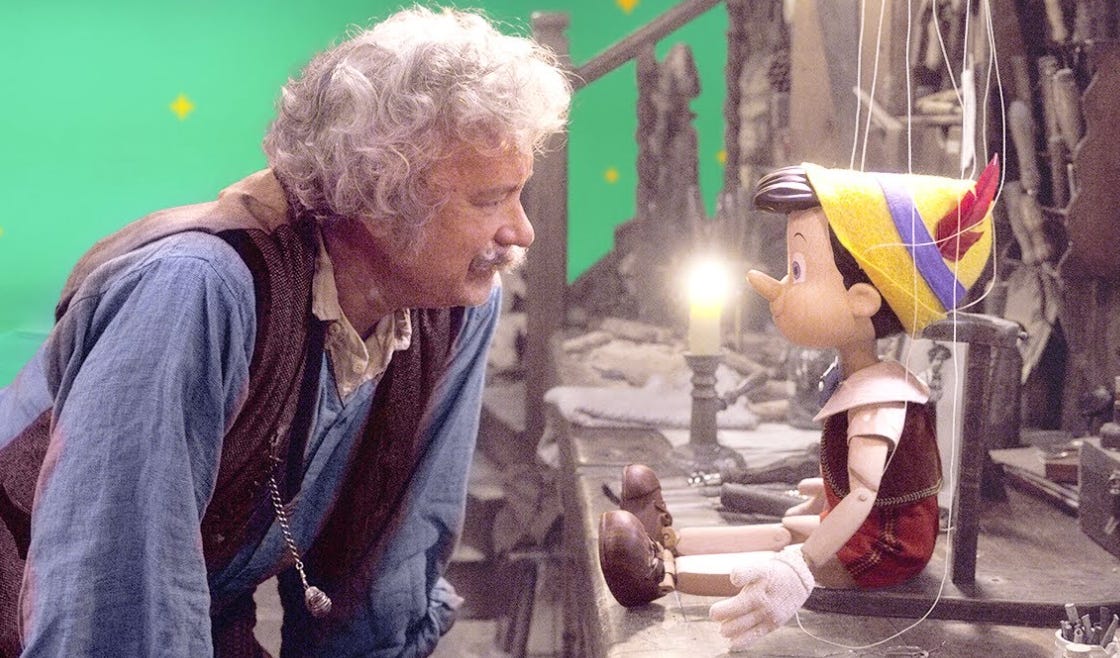Perfection Sucks: Talk About Your Negative Reviews (#12)
The Positive Psychology Behind Sharing Negative Information
Trivia Time: Disney announced on June 1st 2022 that this film will bypass a theatrical release and instead become a Disney+ Premium exclusive on September 8th 2022. However, this film first debuted in the 1940s and flopped at the box office, due to World War II's closure of the European and Asian markets. What movie am I?
3…2…1…
Did you get it?
Answer: Pinocchio
So, today, we’ll do 2 things:
I'm going to explain a psychological effect called "The Blemishing Effect." You and I will learn how to use this one simple thing when we talk to customers to make them trust us more. It resembles the same lessons discussed in Pinocchio.
And we’ll also meet one of my really smart CSM friends… it’s going to be fun :)
What I’m learning:
Let's face it… We are all getting less and less trusting of "marketing talk," including our customers.
”Our product solves ALL YOUR PROBLEMS” “We’re the #1, and we don’t have any hiccups” “Everything is perfect with us”
However, the more you repeat this, the less trust your customers will have in you.
You might be right, but from that Zoom screen, your customers will see you as Pinocchio.
That’s because a study conducted by Power Reviews (a review company) and Northwestern University found that the likelihood of purchasing a product is highest when its average star rating is between 4.2 and 4.5. If the average number of stars exceeds 4.5, the likelihood of a purchase decreases.
A shopper may conclude that a brand is hiding something if there are no negative reviews — and that they should not be trusted.
On the other hand, the occasional negative review can actually boost a product's sales, as it brings the average star rating closer to the optimal range of 4.2 to 4.5 stars.
The Blemishing Effect says that people tend to see things in a more positive light when we compare them to small, negative flaws.
After reading this insight, I added a brief statement to my introductory calls to increase my clients' trust in me and to clarify my intentions.
It’s working phenomenally well… and adopting a similar habit may work well for you too.
Especially since you’re a role where you’re communicating with others constantly.
Feel free to adopt my phrase to come across a trustworthy communicator:
So, why should you care?
1. It establishes insane credibility.
I’ve noticed my customers go “hmm…yep. This is great” I notice the lightbulb moment when they realize that they don’t want to be lumped in as a “unsuccessful customer.” By emphasizing this insight, I come across as a CSM who has witnessed the good, the bad, and the ugly... Knowing this is oddly comforting for the customer.
2. You become a trustworthy communicator.
I intentionally use the word "story" at the beginning so that my audience does not feel as though I am speaking directly to them.
3. Adoption becomes a team effort.
After sharing this, it is simple to ask customers right after who needs to be involved for specific tasks. They begin listing names of individuals they want us to include in the conversation we are currently having.
Consumers believe that products with a perfect five-star rating are too good to be true. Don’t lie. Let’s learn from Pinocchio, and remind ourselves the lessons we learned when we were younger that honesty is the best policy towards becoming effective communicators.
Meet my Smart CSM Friend - Jeremy Asiedu
Meet Jeremy Asiedu. An amazing person that’s managing CSMs, and a CS Leader @ Glassdoor.
Jeremy is incredibly smart.
I care about how Jeremy thinks so I asked Jeremy 3 questions:
1) Could you teach us a specific process you've implemented within your role that has made an impact on your quota? If you're non quota carrying CSM, can you tell us about a process that has made a positive impact on your ability to excel at your job?
Jeremy: Once you understand how you are measured, create a project plan that connects daily tasks to the end goal. A wise person once said "those who create a plan and stick to it will be the most successful" While I am no longer quota carrying since I manage a team, I still use this same approach for my day to day.
NLCS Thoughts: Sounds like creating a successful mutual action plan for you + your manager. Sounds simple, but I bet it’s highly effective.
2) Do you have a "favorite failure?" A failure that once seemed like a set back, but set you up for success later in life?
Jeremy: A failed relationship. Everything we do comes from the health of our heart and sometimes allowing our heart to break can expose you to parts of yourself that are necessary to birth your full potential. Getting my heart broken is what catapulted me into therapy thus awakening my level of self awareness. Ultimately, it is what allowed me to be the leader I am today.
NLCS Thoughts: I wish other leaders were as open and honest as you just were. Our emotional health is just as important as our physical health. I’m learning to work on both currently,. and it’s been one of the best decision I’ve ever made.
3) Picture your most successful CSM colleague. What skills do they not have that, if they got them in the next three months, would make them one of the best? (This question can help people get ahead in their careers and improve their quality of life by giving them a chance to identify skills that even the top performers are still developing)
Jeremy: Confidence! We all struggle with imposter syndrome (even your most successful CSMs) but your ability to recognize how valuable you are is what allows you to show up as a strategic partner, great collaborator and escalate feedback to your leaders when no one else wants to speak up. It is one of the most undervalued yet powerful skills because being a CSM requires many different hats and a confident person will be able to challenge themselves even when they may not have the right answer - they have confidence in their ability to figure it out.
NLCS Thoughts: I've found that not having confidence comes from feeling like your communication skills aren't good enough. And it’s a question that’s bugged me for a long time: How do you become an effective communicator if you're not naturally good at it?
Customer Success is one of the fastest-growing roles, but every resource I found on how to communicate effectively was either too vague or created corny movie-like speech scenarios that don't happen in real life.
To improve my Customer Success communications skills, I built NLCS with the intention to send out a simple weekly email with frameworks and examples of effective communication strategies
So others that are reading this can easily model these things for themselves and have the confidence to level-up up in their customer-facing roles in 5 minutes or less.
That’s it for this week
Reply back - how will share your flaws with the world this week? :)
Today, you and I learned:
A psychological effect called "The Blemishing Effect." You and I learned how to use this one simple thing when we talk to customers to make them trust us more. It resembles the same lessons discussed in Pinocchio.
And we met one of my really smart CSM friends… Jeremy Asiedu
Every week, I dedicate over 80 hours to learning or practicing effective communication techniques so that I can distill it all into a <5-minute read for you.
Think of this newsletter as the friend you had in college who goes to all the lectures and takes detailed notes so you don't have to miss out on your fun while I do all the work.
I spend a lot of time making sure I write something that brings value to you.
The best compliment you could pay NLCS would be to share it with one person who would find this content valuable.
If you know any Customer Success professionals who could benefit from this level of transparency, I would love to bring them into our small circle of people who care about Customer Success. Please feel free to forward this article and others from the NLCS (New Laws of Customer Success) universe to grow our tight-knit community one person at a time.
Sending you great vibes -
Ya boi / friend @ NLCS. That’s it for this week :)








